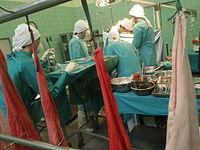
Photo from wikipedia
There is no published data on the factors bariatric surgeons think make bariatric surgery challenging. This study aimed to identify factors that bariatric surgeons feel and increase the technical complexity… Click to show full abstract
There is no published data on the factors bariatric surgeons think make bariatric surgery challenging. This study aimed to identify factors that bariatric surgeons feel and increase the technical complexity of bariatric surgery. Bariatric surgeons from around the world were invited to participate in a questionnaire-based survey on Survey Monkey®. An Average Weighted Score was calculated for each factor. A score of < 1.0 meant that the factor was perceived to make surgery technically easier. Three hundred seventy bariatric and metabolic surgeons from 59 countries completed the survey. The top 10 factors that our respondents felt were most important for determining the technical difficulty of a procedure were inappropriate trocar placement (AWS 3.44), BMI above 60 (AWS 3.41), open bariatric surgery (AWS 3.26), less experienced bariatric anesthetist (AWS 3.18), liver cirrhosis (AWS 3), large liver (AWS 2.99), less experienced bariatric assistant (AWS 2.97), lower surgeon total bariatric surgery volume (AWS 2.95), lower surgeon specific procedure volume (AWS 2.85) and previous laparotomy (AWS 2.83), respectively. Respondents also felt that the younger patients (AWS 0.78), dedicated operating team (AWS 0.67), BMI less than 35 (AWS 0.54), and French position (AWS 0.45) actually make the surgery easier. This survey is the first attempt to understand the factors which make bariatric surgery more difficult. Knowing the factors made the operation more challenging, led to better scheduling the potentially difficult patients to reduce the complications.
Journal Title: World Journal of Surgery
Year Published: 2021
Link to full text (if available)
Share on Social Media: Sign Up to like & get
recommendations!